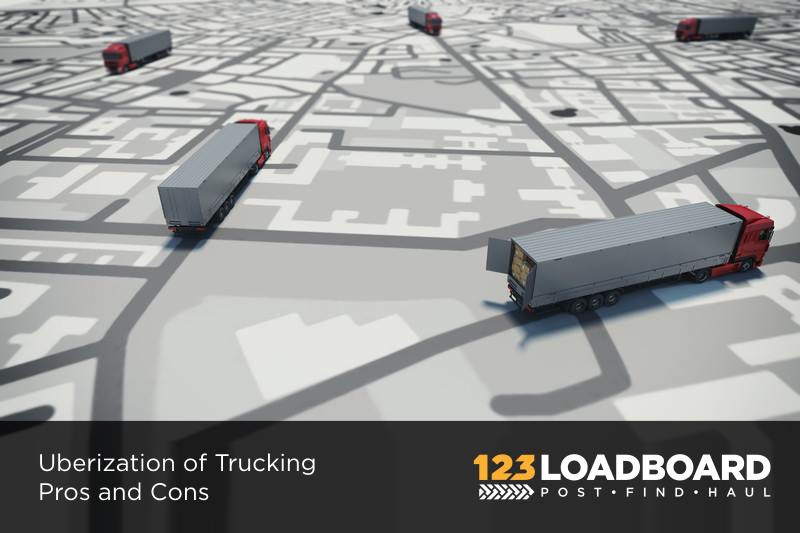Uberization of Trucking – Pros and Cons
Uberization of Trucking Shows Promise With Challenges
After a night on the town, virtually anyone with a cell phone can request a vehicle to come pick them up at their exact location. The days of calling for a taxi have changed dramatically. The Uber effect on our society means with a touch of a button, a vehicle – one that customers can choose specifically – will be at your curbside in minutes. About five years ago, trucking industry experts predicted similar services would soon emerge for the transportation of goods across the country. Now, we’re seeing the use of virtual broker – online freight marketplaces where shippers can place the load they need to be picked up and transported, and drivers can scroll through the possible jobs to choose the one for which they have enough space and the tools needed to haul the specific cargo. The conversation for truckers and freight brokers now turns to the benefits versus the challenges of this new business model – The uberization of trucking.

Uber Trucking Benefits
The idea of an Uber-like system for truckers addresses the needs of both parties involved. The business model would match up drivers to shipments, preventing empty loads and essentially eliminating the need for the freight broker. The idea could lower costs by ensuring nearly every truck has a full load. Big rigs hitting the road with empty or nearly-empty cargo areas is a big financial hit for companies operating with fewer than 20 trucks, and according to the American Trucking Association (ATA), that’s roughly 97.2% of carriers. The Uberization of trucking also addresses the needs of shippers. Through on-demand trucking load board services, shippers are nearly guaranteed to have their load delivered on time and on budget. Shippers also have the benefit of decreasing friction in transactions and removing the middle man by jumping in on a load already in process and completing the delivery at a lower cost.
Uber Trucking Challenges
A system that mirrored Uber was poised to take over the trucking industry. Driver and shippers would both benefit greatly from the digitally based Uber trucking system, but because there’s a profound difference between passenger vehicles and large commercial vehicles, there are inherent challenges to the Uberization of trucking.
Not all cargo is created the same. Unlike people, shipments of stuff – food, vehicles, electronics – need specific types of carriers. On the occasion that a shipment needs a specialty truck, the list of possible drivers is greatly dwindled. Add in potential expiration dates, as with food, and shippers eliminate yet another pool of candidates.
Another major challenge with pulling the trucking industry into the Uber world is the lack of a long-term, trusting relationship between drivers and shippers. Finding a driving company that is punctual and safe with deliveries can take some time, and many shippers aren’t willing to risk the value of a load to a driver with whom they haven’t worked.
As innovative technology enters the nearly $700 billion industry, leaders at trucking companies and drivers alike must take a comprehensive look at how that technology can help drive the industry forward, and what tools may need refining before they can be utilized. Skilled, trustworthy drivers aren’t developed through an Uber trucking app, so developing solid business relationships will still be needed on some level, despite the Uberization of trucking.


Give us your opinion!